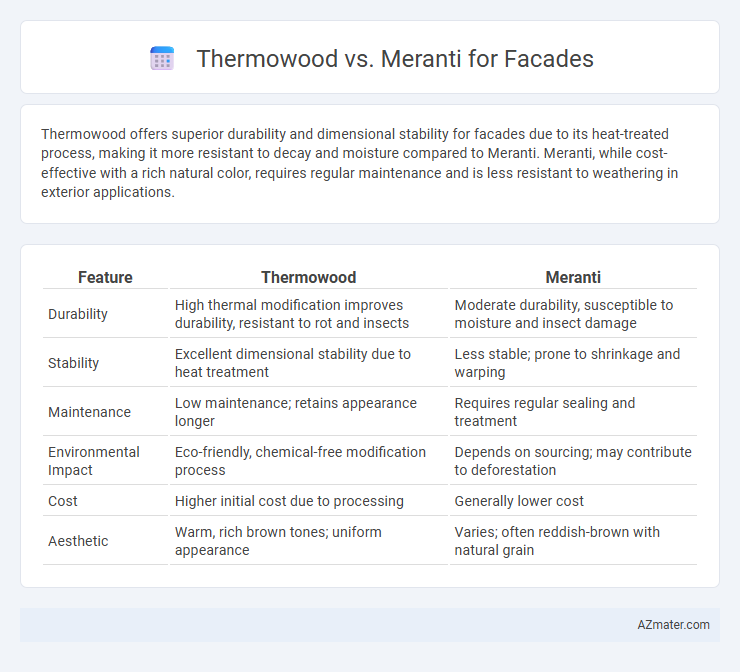Thermowood offers superior durability and dimensional stability for facades due to its heat-treated process, making it more resistant to decay and moisture compared to Meranti. Meranti, while cost-effective with a rich natural color, requires regular maintenance and is less resistant to weathering in exterior applications.
Table of Comparison
| Feature | Thermowood | Meranti |
|---|---|---|
| Durability | High thermal modification improves durability, resistant to rot and insects | Moderate durability, susceptible to moisture and insect damage |
| Stability | Excellent dimensional stability due to heat treatment | Less stable; prone to shrinkage and warping |
| Maintenance | Low maintenance; retains appearance longer | Requires regular sealing and treatment |
| Environmental Impact | Eco-friendly, chemical-free modification process | Depends on sourcing; may contribute to deforestation |
| Cost | Higher initial cost due to processing | Generally lower cost |
| Aesthetic | Warm, rich brown tones; uniform appearance | Varies; often reddish-brown with natural grain |
Introduction to Thermowood and Meranti
Thermowood is a sustainably heat-treated softwood known for enhanced durability, dimensional stability, and resistance to decay, making it ideal for facades exposed to harsh weather conditions. Meranti is a dense tropical hardwood prized for its rich color and natural resistance to moisture and insects, often used in exterior applications requiring aesthetic appeal and strength. Both materials offer unique benefits for facade cladding, with Thermowood specializing in eco-friendly, long-lasting performance, while Meranti provides a traditional hardwood look and toughness.
Material Origins and Processing Methods
Thermowood is produced through a thermal modification process using Scandinavian softwood species like pine or spruce, where heat treatment enhances durability and dimensional stability without chemicals. Meranti, sourced primarily from Southeast Asian hardwood species such as Shorea, undergoes conventional milling and drying but lacks thermal modification, making it more susceptible to moisture and decay. The heat treatment in Thermowood significantly improves resistance to weather and biological degradation, positioning it as a superior choice for facade applications compared to untreated Meranti.
Durability and Weather Resistance
Thermowood offers superior durability and weather resistance due to its heat treatment process, which enhances dimensional stability and reduces moisture absorption, making it highly resistant to rot and decay. Meranti, a tropical hardwood, provides good natural durability and moderate weather resistance but generally requires regular maintenance and protective coatings to withstand harsh outdoor conditions. For facade applications exposed to varying weather, Thermowood delivers longer-lasting performance with minimal upkeep compared to Meranti.
Aesthetic Qualities and Color Variations
Thermowood offers a uniform, warm brown hue that deepens with age, providing a sleek, modern aesthetic ideal for contemporary facades. Meranti wood displays a broader color spectrum ranging from reddish-brown to pale yellow, contributing to a more varied and natural facade appearance. The consistent color stability of Thermowood contrasts with Meranti's dynamic grain patterns, making Thermowood preferable for minimalist designs and Meranti suited for traditional or eclectic architectural styles.
Thermal Insulation Properties
Thermowood offers superior thermal insulation compared to Meranti, with its heat-treated process enhancing resistance to temperature fluctuations and reducing thermal conductivity. Meranti, a dense hardwood, provides moderate insulation but tends to retain heat more, impacting energy efficiency in facade applications. Selecting Thermowood for facades optimizes building insulation, improving energy savings and indoor climate control.
Maintenance Requirements
Thermowood facades require minimal maintenance due to their thermal modification process, which enhances durability and resistance to decay, pests, and weathering without chemical treatments. Meranti, a tropical hardwood, demands regular upkeep, including sealing and staining, to protect it from moisture, UV damage, and fungal attacks common in exterior environments. The lower maintenance needs of Thermowood make it a cost-effective and sustainable option for long-term facade performance.
Environmental Impact and Sustainability
Thermowood and Meranti differ significantly in environmental impact and sustainability for facade use. Thermowood undergoes heat treatment that enhances durability without chemical additives, making it a more eco-friendly option with a longer lifespan and reduced maintenance needs. Meranti, often sourced from tropical forests, raises sustainability concerns due to deforestation and lesser natural resistance, requiring chemical treatments that may affect environmental safety.
Cost Comparison and Availability
Thermowood, a heat-treated timber, generally costs more upfront than Meranti, a tropical hardwood, but offers superior durability and lower maintenance expenses over time. Meranti is widely available in Southeast Asia with moderate pricing but may require regular treatment to withstand weather conditions on facades. Availability of Thermowood depends on regional supply chains, often sourced from Nordic countries, which can influence delivery times and overall project costs.
Facade Installation and Workability
Thermowood offers superior workability for facade installation due to its lightweight structure and uniform thermal modification process, which enhances dimensional stability and reduces the risk of warping or cracking. Meranti, while durable, requires more careful handling and pre-treatment to resist moisture and insect damage during facade installation, potentially increasing labor time and complexity. Choosing Thermowood can streamline installation with less maintenance, while Meranti demands skilled craftsmanship and additional protective measures for optimal facade performance.
Long-Term Performance and Suitability
Thermowood offers superior durability and stability for facades due to its heat-treated properties, which enhance resistance to moisture, decay, and insect damage, ensuring long-term performance in harsh climates. Meranti, a dense tropical hardwood, provides good natural durability and aesthetic appeal but requires regular maintenance, such as sealing and staining, to prevent weathering and degradation over time. For facade applications demanding longevity with minimal upkeep, Thermowood is generally more suitable, while Meranti suits projects prioritizing rich color and grain at the expense of ongoing maintenance.

Infographic: Thermowood vs Meranti for Facade
 azmater.com
azmater.com